Some National Assembly deputies said that state-owned enterprise subsidiaries should not be forced to bid because this is their right to dispose of assets.
On May 23, the National Assembly discussed the Law on Bidding (amended). According to the draft submitted to the National Assembly, the Government proposed to apply bidding to select investors and projects only for state-owned enterprises. Thus, subsidiaries of state-owned enterprises (with 30% or more state capital or less than 30% but the total state capital in the project is over 500 billion VND) will not have to bid.
Mr. Phan Duc Hieu, Standing Member of the Economic Committee, agreed with this plan. According to him, in enterprises with a part of State capital, the interests of private investors are very large. Many private corporations and parent companies in State enterprises also design appropriate bidding processes to prevent losses. That is, the need to prevent capital loss of enterprises in this group already exists, there is no need to stipulate it in the law.
"Expanding the scope of businesses subject to the law will make production and business activities less flexible, affecting investor interests and indirectly affecting state interests," he said.
Supporting Mr. Phan Duc Hieu’s view, delegate Truong Trong Nghia said that we should not be extreme in forcing subsidiaries of state-owned enterprises to comply with the Law on Bidding. According to him, it is necessary to distinguish between state-owned enterprises and units with state investment capital. For example, an enterprise that holds more than 50% of state capital when investing in another enterprise may only hold 5-10% of the capital in this unit.
"The low State capital ratio and the fact that it is subject to the Law on Bidding is extreme and unnecessary," said Mr. Nghia.
On the other hand, according to delegate Nghia, the enterprise is ultimately responsible for the bidding results, not "the more coils the better".
"Anyone who is corrupt or negative has regulations on inspection and examination. The Law on Bidding cannot overcome all corruption and negative behavior," Mr. Nghia stated his opinion.
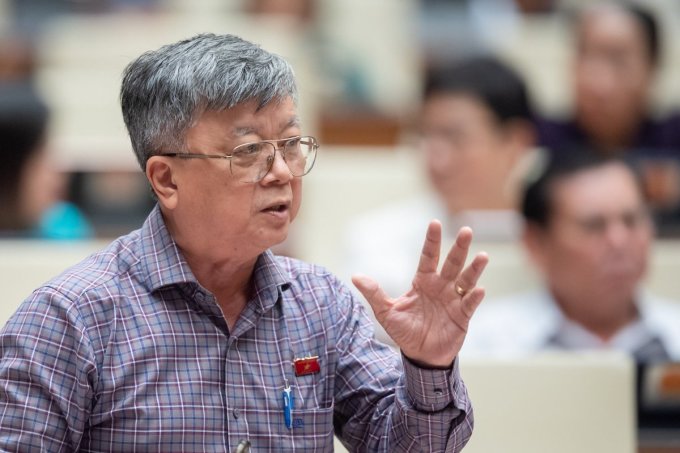
Mr. Truong Trong Nghia speaks at the discussion session on the draft Law on Bidding (amended), May 23. Photo: Hoang Phong
Disagreeing, Mr. Nguyen Huu Toan, Deputy Chairman of the Finance and Budget Committee, argued. Mr. Toan said that the Bidding Law is a tool for managing and controlling the use of state budget money, revenue sources originating from the budget and state-owned enterprises.
"The Party's policy is not to interfere with the rights of enterprises. This bidding is carried out by enterprises, the State does not intervene. There is no resolution stating that bidding is not carried out, because this is a management tool, applied not only in the State's field," he said.
Sharing the same opinion with delegate Toan, Mr. Tran Van Tien suggested that the Government assess the impact more carefully in the case of enterprises in which the State holds up to 50% of the charter capital.
"When a business enters into a joint venture or association with another business but the capital ratio of the state-owned enterprise implementing the bid or project is less than 50%, how will it be handled?", Mr. Tien raised the question.
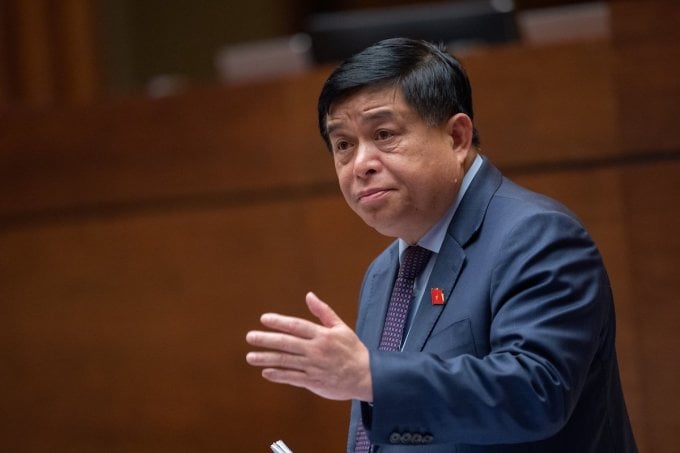
Minister of Planning and Investment Nguyen Chi Dung explains at the discussion session of the draft Law on Bidding (amended), May 23. Photo: Hoang Phong
Minister of Planning and Investment Nguyen Chi Dung acknowledged that this is a difficult law because it must resolve problems and create conditions for bidding and state management activities.
"If we manage too tightly, we will lose autonomy and cause difficulties, congestion and then have to amend the law. If we manage too loosely, we will not be able to ensure state management," said Mr. Dung.
Clarifying the Government's plan, the Minister of Planning and Investment said that applying bidding only to state-owned enterprises still ensures strict management of the use of state capital. Because, the draft law stipulates that all activities of selecting contractors using budget capital, whether state-owned enterprises or not, must be conducted by bidding. On the other hand, state-owned enterprises must be responsible for preserving and effectively using state capital.
"The State does not interfere in the investment and business activities of State-owned enterprises in other units but must ensure economic efficiency," he said.
Minister Nguyen Chi Dung also said that the Government's proposal is consistent with the Central Government's viewpoints and relevant laws. This proposal also creates openness and convenience for bidding by State-owned enterprises and effective management of State capital.
The National Assembly is expected to vote and pass the Law on Bidding (amended) on June 23.
Source link


![[Photo] Hundred-year-old pine trees – an attractive destination for tourists in Gia Lai](https://vstatic.vietnam.vn/vietnam/resource/IMAGE/2025/4/17/25a0b7b629294f3f89350e263863d6a3)
![[Photo] Warm meeting between the two First Ladies of the Prime Ministers of Vietnam and Ethiopia with visually impaired students of Nguyen Dinh Chieu School](https://vstatic.vietnam.vn/vietnam/resource/IMAGE/2025/4/17/b1a43ba73eb94fea89034e458154f7ae)
![[Photo] President Luong Cuong receives Kenyan Defense Minister Soipan Tuya](https://vstatic.vietnam.vn/vietnam/resource/IMAGE/2025/4/17/0e7a5185e8144d73af91e67e03567f41)
![[Photo] Prime Minister Pham Minh Chinh and Ethiopian Prime Minister visit Tran Quoc Pagoda](https://vstatic.vietnam.vn/vietnam/resource/IMAGE/2025/4/17/18ba6e1e73f94a618f5b5e9c1bd364a8)
![[Photo] President Luong Cuong receives UN Deputy Secretary General Amina J.Mohammed](https://vstatic.vietnam.vn/vietnam/resource/IMAGE/2025/4/17/72781800ee294eeb8df59db53e80159f)
![[Photo] President Luong Cuong receives Lao Prime Minister Sonexay Siphandone](https://vstatic.vietnam.vn/vietnam/resource/IMAGE/2025/4/17/337e313bae4b4961890fdf834d3fcdd5)









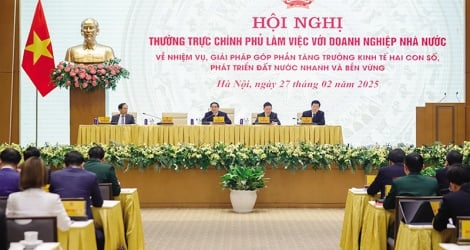












































![[Video] Viettel officially puts into operation the largest submarine optical cable line in Vietnam](https://vstatic.vietnam.vn/vietnam/resource/IMAGE/2025/4/17/f19008c6010c4a538cc422cb791ca0a1)














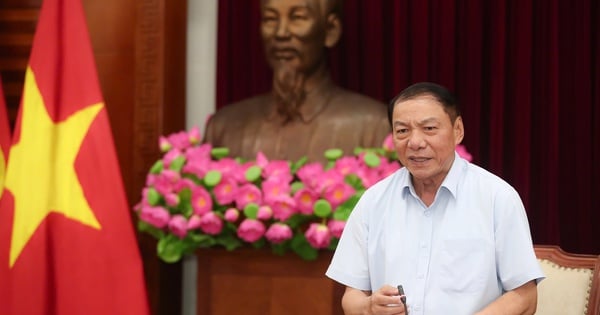


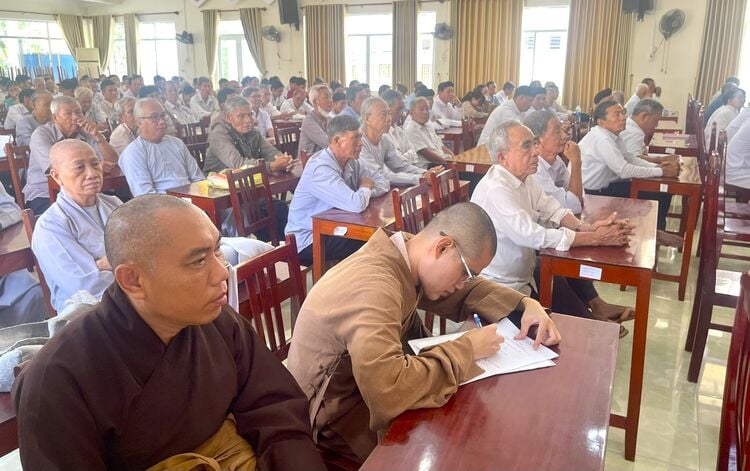




















Comment (0)